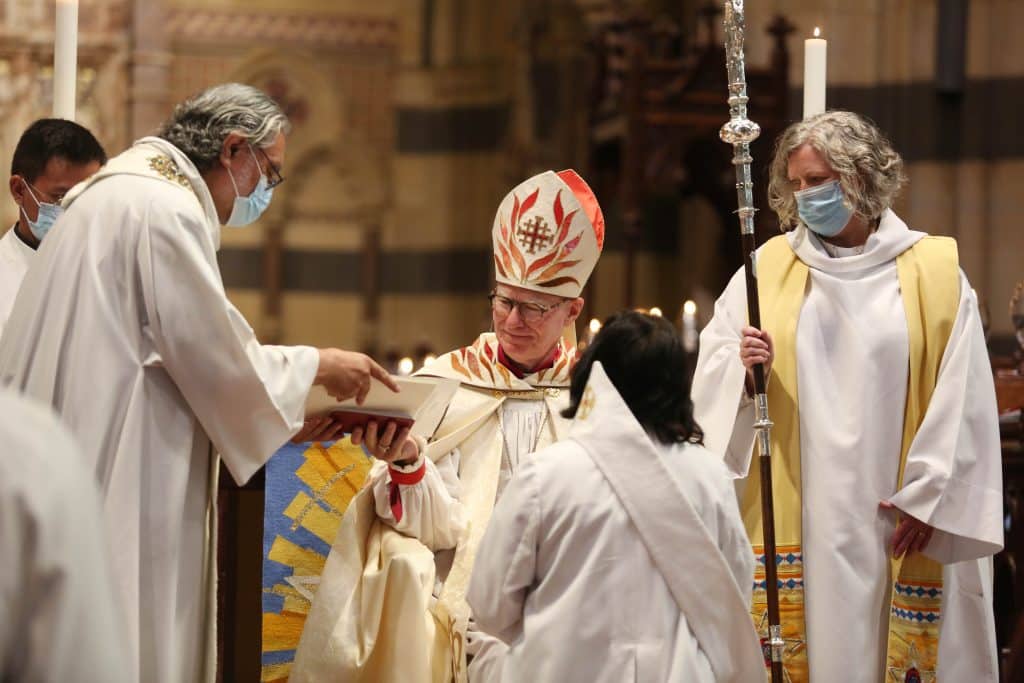
Jenan Taylor
3 October 2022
High numbers of vacant parishes have sparked concerns about burnout among ministers, as Melbourne’s synod prepares to discuss the issue in October.
The career span of ministers, including the potential impacts of heavy non-pastoral workloads and of burnout, is also on the synod agenda.
Training bodies such as Trinity College said increasing administration was causing frustration and burnout among clergy, who were feeling they were not doing what they were called to do.
Retired vicar the Reverend Dr Ian Savage said unrelieved burnout had presented a major challenge for him in the last 11 years of his 19-year incumbency at Holy Trinity Hampton Park.
Dr Savage said that he had been dispirited and depressed for a very long time and that there had seemed no break to the effort he had been putting in. He was 67 when he retired from leading Holy Trinity in 2019.
He said he felt the position had become untenable for him, because of a combination of an escalated workload especially in compliance areas, the realisation he could not attend to everything that needed to be done, and that the parish believed the buck stopped at him.
Trinity College Ministry Education Centre director the Reverend Dr Fergus King said the high non-pastoral workload included compliance work which had become a major issue for ministers, because of requirements in the wake of historical sexual abuse scandals.
Read more: Clergy shortage, biblical marriage on Melbourne Synod agenda
Dr King said this was unfortunate but that it demanded a degree of professionalism and training which often by default went to the parish clergy. He said many would see their time being swallowed by having to fill in forms and tick boxes on government or diocesan legislation.
It could lead to frustration if people felt that this was stopping them from looking after people, preaching the word and administering sacraments, Dr King said.
But he also said there could be knock-on effects for parishes who did not have full time priests.
“It often means that your lay people in the parish council, the parish treasurer, the secretary and the church wardens, are being asked to pick up a phenomenal legal burden and legal liability in a way that previous generations never did,” Dr King said.
“Now, that’s not to say that that’s right or wrong. It’s just to say that the fact of the matter is that the world has changed, and we cannot run a public organisation in a slipshod way.”
Dr King also said it was particularly concerning that there were around 37 vacant parishes in the diocese, according to a September 2022 diocesan circular.
He said the diocese might not be ordaining enough people to fill in the gaps, given the number of vacancies and that the current anticipated number of new ordinands in February 2023 was expected to be no higher than 20 people.
But Bishop Brad Billings said that during the last seven years the diocese’s ordinations had remained consistent at around 15 to 20 deacons most years.
Bishop Billings said it was unconfirmed, but it was likely that the next ordination in February 2023 would be at the lower end, under 15 people, and possibly just 14.
He said however that fostering of vocations to ordained ministry was a shared responsibility across the whole church.
“Parishes, chaplains in schools, people in other places need to be thinking about praying about who amongst their communities, may be called to a vocation in ordained ministry and whether they should perhaps initiate a conversation about that or suggest they attend a sermon, discernment process or vocation’s day that we run.”
Read more: It’s our future, so how can we fit ministry formation to the 21st century?
Ridley College Anglican Institute dean the Reverend Canon Dr Rhys Bezzant said it was of huge concern that parish priests were so busy.
Dr Bezzant said the increasing workload was among the many impediments that made Christian ministry harder to do and that made the job unattractive.
“The idea that they would spend time and effort and perhaps finances in raising up the next generation from within their own parishes just falls off the edge,” Dr Bezzant said.
Dr Bezzant and Dr King have put a motion to synod asking all clergy and bishops to nuture future clergy. The motion underscores the large number of vacant parishes.
Bishop Billings said that the diocese was aware that compliance and administrative burden had accumulated year by year and had started taking steps to relieve this, including reviewing training and whether it could be more flexible and tailored, particularly for new clergy.
He said that the diocese had also begun exploring new models of ordination including one that was more tailored to the ordination candidate’s aspirations in ministry.
Oakleigh Anglican vicar the Reverend Colleen Arnold-Moore said she believed there was a high burnout rate and that there had been a number of clergy who had retired earlier than expected.
But she said it was more complicated than about how many people were being ordained or coming through to take their place.
“Compassion fatigue, and the exhaustion of two years of COVID has left them depleted, they need not just a month’s holiday but a longer break,” she said.
Ms Arnold-Moore, who wrote about the importance of ministry formation in The Melbourne Anglican in April, also said that the healthiest ministry occurred in places where there were teams of leaders, whether ordained or lay.
The load and the ministry should be divided according to people’s gifts, rather than just being the responsibility of one person, Ms Arnold-Moore said.
Dr Savage said he had now turned his attention to locum work where he was not expected to take on that much commitment.
“I decided that never again was I going to be the only person doing everything. There had to be an equal stakeholder,” Dr Savage said.
“Ministry is about listening and not about deciding what is to be done. That might mean, in practise, doing a lot less, but it is about ‘We are the Body of Christ’, not ‘I am the body of Christ’.”
For more faith news, follow The Melbourne Anglican on Facebook, Twitter, or subscribe to our weekly emails.






